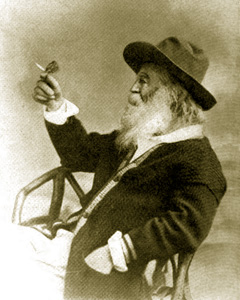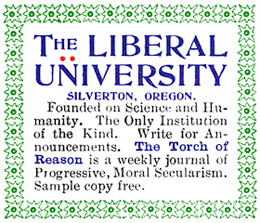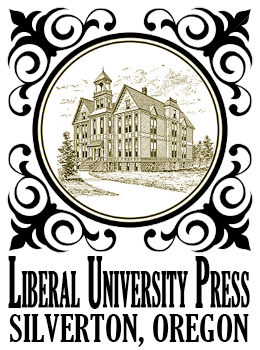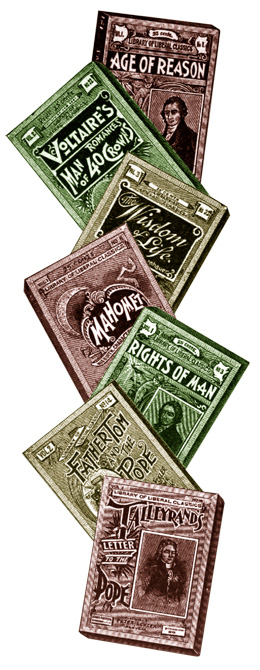By Mary G. Woodhull — May, 1901
 From The Literary Era: From the time I was a child I was familiar with the picturesque form and face of Poet Whitman. His genial “How are you, my child?” still rings in my ears, and many a time did I turn to catch a glimpse of the noble head, crowned with its silver hair. The last time I saw the “good gray poet” was in his humble little Camden home. I found him seated in an arm-chair before the fire, enveloped in a dark-blue dressing-gown, his slippered feet almost hidden from view in a huge gray fur rug. Papers, pamphlets, books and letters were strewn in careless fashion about the room. On the well-filled table stood a small pitcher containing a solitary hothouse flower. A pot of yellow tulips, hinting of the coming springtide, stood on a chair at the poet’s elbow, while overhead his pet canary softly chirped. On one end of the plain wooden mantel stood a bust of Carlyle; on the other, one of Emerson, the “Concord Sphinx,” who was so great an admirer of the Jersey poet.
From The Literary Era: From the time I was a child I was familiar with the picturesque form and face of Poet Whitman. His genial “How are you, my child?” still rings in my ears, and many a time did I turn to catch a glimpse of the noble head, crowned with its silver hair. The last time I saw the “good gray poet” was in his humble little Camden home. I found him seated in an arm-chair before the fire, enveloped in a dark-blue dressing-gown, his slippered feet almost hidden from view in a huge gray fur rug. Papers, pamphlets, books and letters were strewn in careless fashion about the room. On the well-filled table stood a small pitcher containing a solitary hothouse flower. A pot of yellow tulips, hinting of the coming springtide, stood on a chair at the poet’s elbow, while overhead his pet canary softly chirped. On one end of the plain wooden mantel stood a bust of Carlyle; on the other, one of Emerson, the “Concord Sphinx,” who was so great an admirer of the Jersey poet.
It was Emerson who said of Walt Whitman, “He is apparently the greatest democrat the world has seen.”
I could not help wondering as I looked at the failing old man if he ever felt lonely, with none near and dear to minister to his wants. Breaking in upon the thought, I said, “Mr. Whitman, has the winter seemed long to you?” “Yes,” he replied, slowly; “the days roll round monotonously.” “What! With your hooks, and friends, and writing?” I asked. Very gently he made reply, “Time grows weary with years and the weight of sin.” My eyes filled with sudden tears, and a longing to say something consoling came over me, but no word would come. Then, struck by the sadness of the poet’s reply, I ventured to ask if the words were a quotation, or his own.
He replied, “They’re from an old song I used to hear, years ago, when I was a boy.” Just then we were interrupted by the entrance of an expressman bringing in a package.
Walt Whitman greeted the man cordially in his deep, musical tones, and in return was addressed by the expressman as “Uncle Walt.” When he had gone the old poet said musingly, “They seem to belong to me, those men; to be a part of me, some way.”
Ah! Was it any wonder the soldier boys in the hospitals, the firemen, car-drivers and ferry-men loved him as they did? His kindly observing eye seemed to declare, “I am a man, and I have an interest in everything that concerns humanity.” As I left the little brown house that afternoon I did not know that the old gray-haired poet had said his last farewell to me, but a feeling of sadness settled over my heart, for I thought how true it is—
“Dim with the mist of years gray flits the shade of power,”
And again Walt Whitman’s words recurred to me—
“Time grows weary with years and the weight of sin.”
The portrait which is here reproduced is, I believe, a rare one. Meeting Walt Whitman upon one occasion, I said, earnestly, “Oh, Mr. Whitman, I do want your picture so much!” The mother of one of my school friends, who was present, said kindly: “I have an extra one that you may have.” I thanked her warmly, and then, to my surprise and satisfaction, the “good gray poet” said, in his slow, sonorous tones:
“I have another that you may have, my child. It was taken one summer at Ocean Grove. I used to spend hours every day on a rustic bench overlooking the sand and the sea. Oftentimes butterflies would flutter and hover about me, and sometimes they would even sit upon my outstretched finger. A photographer came to me one day and asked me to let him take my picture. I consented, and the picture I give you was the result.”
The very next time I met Mr. Whitman he drew the promised picture from his pocket and placed it in my eager hand. “It was so very kind of you to remember. I thank you so much,” I said gratefully.
“You are quite welcome, my child; and remember, it was a real butterfly on my finger.”





